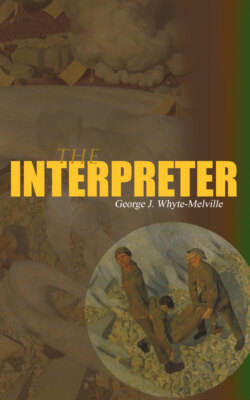Читать книгу The Interpreter - George J. Whyte-Melville - Страница 9
На сайте Литреса книга снята с продажи.
Chapter IV.
Father and Son
ОглавлениеTable of Contents
The Count's old steward has seen all go to rest in the castle; the lords have left the banqueting-room, and the servants, who have been making merry in the hall, are long ere this sound asleep. It is the steward's custom to see all safe before he lights his lamp and retires to rest; but to-night he shades it carefully with a wrinkled hand that trembles strangely, and his white face peers into the darkness, as though he were about some deed of shame. He steals into the Ghost's Gallery, and creeps silently to the farther end. There is a dark object muffled in a cloak in the gloomiest corner, and the light from the steward's lamp reveals a fine young man, sleeping with that thorough abandonment which is only observable in those who are completely outwearied and overdone. It is some minutes ere the old man can wake him.
"My boy!" says he; "my boy, it is time for us to part. Hard, hard is it to be robbed of my son—robbed—" and the old man checks himself as though the word recalled some painful associations.
"Ay, father," was the reply, "you know our old Croatian proverb, 'He who steals is but a borrower.' Nevertheless, I do not wish the Austrians to 'borrow' me, in case I should never be returned; and it is unmannerly for the lieutenant to occupy the same quarters as the general. I must be off before dawn; but surely it cannot be midnight yet."
"In less than an hour the day will break, my son. I have concealed you here because not a servant of the household dare set foot in the Ghost's Gallery till daylight, and you are safe; but twenty-four more hours must see you on the Danube, and you must come here no more. Oh, my boy! my boy!—lost to save me!—dishonoured that I might not be disgraced!—my boy! my boy!"—and the old man burst into a passion of weeping that seemed to convulse his very frame with agony.
The son had more energy and self-command; his voice did not even shake as he soothed and quieted the old man with a protecting fondness like that of a parent for a child. "My father," said he, "there is no dishonour where there is no guilt. My first duty is to you, and were it to do again, I would do it. What? it was but a momentary qualm and a snatch at the box; and nowyou are safe. Father, I shall come back some day, and offer you a home. Fear not for me. I have it here in my breast, the stuff of which men make fortunes. I can rely upon myself. I can obey orders; and, father, when others are bewildered and confused, I can command. I feel it; I know it. Let me but get clear of the 'Eagle's' talons, and fear not for me, dear father, I shall see you again, and we will be prosperous and happy yet. But, how to get away?—have you thought of a plan? Can I get a good horse here? Does the Count know I am in trouble, and will he help me? Tell me all, father, and I shall see my own way, I will answer for it."
"My gallant boy!" said the steward, despite of himself moved to admiration by the self-reliant bearing of his son; "there is but one chance; for the Count could not but hand you over to Wallenstein if he knew you were in the castle, and then it would be a pleasant jest, and the nearest tree. The General is a jovial comrade and a good-humoured acquaintance; but, as a matter of duty, he would hang his own son and go to dinner afterwards with an appetite none the worse. No, no. 'Trust to an Austrian's mercy and confess yourself!' I have a better plan than that. The Zingynies are in the village; they held their merrymaking here yesterday. I saw their Queen last night after you arrived. I have arranged it all with her. A gipsy's dress, a dyed skin, and the middle of the troop; not an Austrian soldier in Hungary that will detect you then. Banishment is better than death. Oh, my boy! my boy!" and once more the old man gave way and wept.
"Forward, then, father!" said the young man, whom I now recognised as my travelling acquaintance; "there is no time to lose now. How can we get out of the castle without alarming the household? I leave all to you now; it will be my turn some day." And as he spoke he rose from the steps on which he had been lying when his recumbent form had so alarmed Victor and myself, and accompanied his father down a winding staircase that seemed let into the massive wall of the old building. My curiosity was fearfully excited. I would have given all my playthings to follow them. I crept stealthily on, naked feet and all; but I was not close enough behind, and the door shut quietly with a spring just as my hand was upon it, leaving me alone in the Ghost's Gallery. I was not the least frightened now. I forgot all about ghosts and Breviaries, and stole back to my nursery and my bed, my little head completely filled with a medley of stewards and soldiers and gipsies, and Austrian generals and military executions, and phantom dogs and secret staircases, and all the most unlikely incidents that crowd together in that busy organ—a child's brain.
